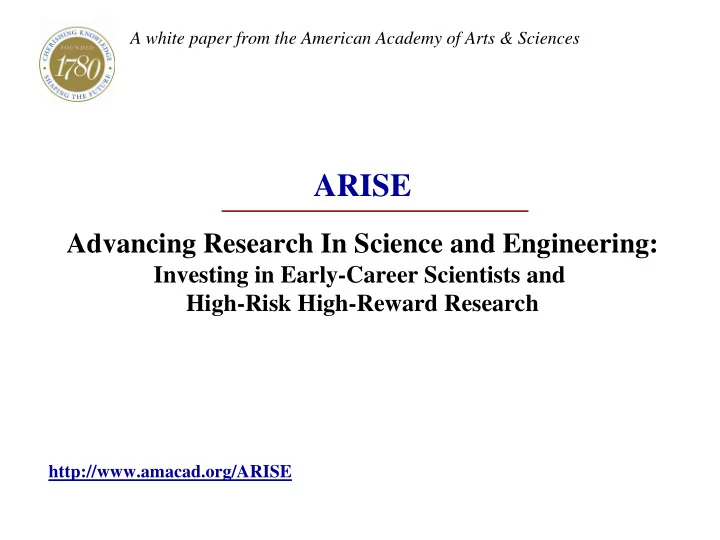

A white paper from the American Academy of Arts & Sciences ARISE Advancing Research In Science and Engineering: Investing in Early-Career Scientists and High-Risk High-Reward Research http://www.amacad.org/ARISE
A white paper from the American Academy of Arts & Sciences Committee Members Thomas Cech Chair (Howard Hughes Peter Kim ( Merck Research Laboratories ) Medical Institute) Neal Lane ( Rice University ) David Baltimore (California Institute of C.D. Mote Jr. (University of Maryland) Technology) Daphne Preuss (University of Chicago) Steven Chu (Lawrence Berkeley National David Sabatini (New York University Laboratory) School of Medicine) France Córdova (Purdue University) Randy Schekman (University of California Thomas Everhart (California Institute of at Berkeley) Technology) Richard Scheller (Genentech) Richard Freeman (Harvard University) Albert Teich (American Association for the Susan Graham (University of California at Advancement of Science) Berkeley) Mark Wrighton (Washington University in David Goldston (Former Staff Director of St. Louis) the House Science Keith Yamamoto (University of California Committee) at San Francisco) Robert Horvitz (Massachusetts Institute of Huda Zoghbi (Baylor College of Medicine) Technology) Leslie Berlowitz (American Academy of Linda Katehi (University of Illinois Arts and Sciences) ex officio at Urbana-Champaign)
A white paper from the American Academy of Arts & Sciences The American Academy’s ARISE report addresses the modes and mechanisms of funding, and in particular two issues central to the nation’s research efforts that have not received sufficient attention: • Support for early-career faculty. • Encouragement of high-risk, high-reward, potentially transformative research. The committee members strongly believe that, regardless of overall federal research funding levels, America must invest in young scientists and transformative research in order to sustain its ability to compete in the new global environment.
A white paper from the American Academy of Arts & Sciences Early-Career Faculty • Recommendations for Federal Agencies Create or strengthen existing large, multi-year awards for early-career faculty. • Pay special attention to early-career faculty during merit reviews of regular grant • programs. Career-stage-appropriate expectations should be adopted for mainstream grant funding. Provide seed funding for early-career faculty to enable them to explore new ideas • for which no results have yet been achieved. Develop policies responsive to the needs of primary caregivers, a majority of • whom are women, such as grant extensions or other appropriate support mechanisms to enable them to advance in science and engineering. • Recommendations for Universities Develop or strengthen mentoring programs for early-career faculty. • Strengthen promotion and tenure policies for early-career faculty. • Address the needs of primary caregivers. • • Recommendations for Private Foundations Dedicated programs that fund early-career researchers are valuable, but they can • produce windfall effects. Foundations should cap the number of start-up and first awards made to a single • investigator.
A white paper from the American Academy of Arts & Sciences High-Risk High-Reward Research • Recommendations for Federal Agencies Consider targeted programs, grant mechanisms, and policies–and adapt existing • grant programs–to foster transformative research; establish metrics with which to evaluate their success. Strengthen the application and review processes. High-risk research proposals • face even greater challenges in a stressed peer-review system. Invest in program officers. They should be encouraged and expected to engage • with the professional communities they fund. This requires an adequate administrative budget, which should not come at the expense of the research budget.
A white paper from the American Academy of Arts & Sciences Common Issues • Recommendations for Federal Agencies Establish new research programs only if they have enough critical mass to • avoid fruitless grant writing efforts. Grant programs that fund a very small percentage of applications are inefficient uses of money, time, and effort. Collect and analyze demographic data on applicants and principal investigators • government-wide and in a uniform format to establish how well federal agencies support research. The current non-standardized tracking among funding agencies hinders efforts to analyze funding trends. • Recommendations for Universities Accept greater responsibility for salaries of faculty members. While charging a • portion of faculty salaries to research grants is necessary and appropriate, the extreme model of expecting faculty to raise all of the funds for their own salaries, their students’ stipends and tuition, and their research space puts a disproportionate burden on early-career faculty and discourages risk-taking. Shoulder a larger share of the cost of new facilities and programs. As funds are • raised to construct research buildings, campaign goals should include the continuing responsibility to maintain each facility and to support new programmatic activities.
Recommend
More recommend